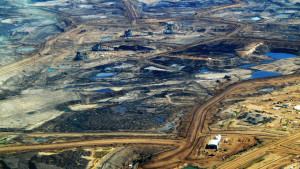EPA Raises Climate Argument Against Keystone XL Pipeline
For over six years, the Keystone XL pipeline has been under a long controversial discussion due to its numerous environmental concerns, including jeopardizing clean water along the pipeline all the way from Canada to Texas. Recently, the Environmental Protection Agency has raised even further environmental concerns due to the possible increase of greenhouse gas emissions if the pipeline is built. Plunging oil prices make the alternative of transporting the tar sands oil by rail uneconomical. Building the pipeline would offer a cheaper method of transport and would therefor increase greenhouse gas emissions.

EPA Assistant Administrator Cynthia Giles’ letter calls for both the Department of State and President Obama’s attention to the EPA’s review of the proposed $7 billion pipeline. Tar sands have significantly greater total greenhouse gas emissions than other crude oils. The emissions equate to 1.3 to 27.4 million metric tons of carbon dioxide equivalent per year, which is “equivalent to the annual greenhouse gas emissions from 5.7 passenger vehicles or 7.8 coal fired power plants,” according to Giles. “Over a 50-year lifetime of the pipeline, this could translate into releasing as much as 1.37 billion more tons of greenhouse gases into the atmosphere.”
President Obama has continuously promised citizens that the pipeline’s entire potential climate hazards would be considered during his decision-making for Keystone, further supported in his speech back in 2013 regarding climate change.
Despite Obama’s inferred veto, there is still continued support for the Keystone pipeline. Companies like TransCanada, the energy company trying to build the international pipeline, claims that the drop in global oil prices will soon pass and that there has been a decrease in Canada’s gas emissions, but the company’s other claims, particularly about job creation have proved false.
Despite concerns about the project, the Senate has approved the Keystone Bill to start building the pipeline, further dividing the chamber and highlighting the Senators’ different stances on climate and environmental issues. The Obama administration is currently evaluating the nation’s comments along with the EPA’s review. Because Keystone crosses international borders, President Obama holds the ultimate right to either approve or reject the proposal.